Reviews: BOOM X, The Sound Inside, Shirley Valentine, The Rage of Narcissus and more
Rick Miller's Gen X show, two tales about storytelling and yet another great Deborah Drakeford performance are among this week's must-see offerings; plus the winners of the 5th Jon Kaplan Legacy Fund Awards

This year's theatre season is winding down, but there's still lots to see, including a couple of shows that just missed the cut-off for this year's Dora Awards nomination consideration. By the way, those get announced on May 29, before the big ceremony itself on June 27. (The "flip date" for Doras was May 14; productions with at least 60 per cent of their run occurring on or before May 14 are part of the 2022-2023 Dora season.)
A definite possibility for next year's Doras is Rick Miller's BOOM X (Rating: ✭✭✭✭), the middle work in his acclaimed multi-media BOOM trilogy that includes the original show about the Baby Boom (and his parents') generation, and BOOM YZ (his daughter's), which premiered in Calgary in October of 2021.
Perhaps because Miller is part of Generation X himself, this show feels more personal and heartfelt than the somewhat chaotic and rambling (yet still entertaining) earlier instalment, which played Toronto back in 2015.
BOOM X covers the history, culture, politics and technology of the world from roughly 1970 through 1995. In addition to video and photographic footage of key moments projected onto a scrim, Miller sings and imitates people behind it, like a master caricaturist. A projected newsfeed-like scroll of 25 years of major events adds another element to absorb in a show that can often seem overwhelming, even for a generation brought up on multitasking with screens of various sizes.
Kudos to video and projection co-designers Nicolas Dostie and Irina Litvinenko, as well as Bruno Matte (lighting design) and Virginie Leclerc (costumes and props). How Miller transforms himself in mere seconds into figures as diverse as Tina Turner and Kurt Cobain (complete with convincing vocals) is astonishing.
It's true that Miller's jaw-dropping performance sometimes overshadows his themes; occasionally he'll attempt some profound statement about the times, making you think about how the mid-70s saw backwards-looking, nostalgic offerings like TV's Happy Days juxtaposed with the rise of the radical punk movement.
What gives BOOM X more heft and weight is the fact that Miller uses not only his own story but those of four people he's interviewed in a casual documentary style: Howard, a politically aware and opinionated guy he interviews in a diner; Annika, who was born in the former East Germany; Steph, a woman who was raised in Exeter, Ontario; and Brandon, a biracial man who's also the youngest of the bunch.
By having these people discuss their lives, Miller touches on issues and experiences that might have escaped his own as a cis, straight, white, middle-class man who grew up in Montreal and went on to study architecture; Annika, for instance, berates him for not knowing who Angela Davis is. And Brandon (played on video by the actor Sébastien Heins) communicates the excitement of exploring his Black roots and hearing hip-hop music for the first time.
Why and how these people were chosen to participate in this show remains one of BOOM X's most pleasant surprises; don't let anyone spoil that for you. The fact that the writer/performer lets his subjects speak for themselves before continuing to voice them himself is yet another stylistic flourish in this smart, entertaining and impeccably-paced show by one of the country's most original and multi-talented artists.
Produced by Kidoons and WYRD Productions in association with Crow's Theatre, Theatre Calgary and The 20K Collective, BOOM X continues at Crow's Theatre (345 Carlaw) until May 28. $50.85-$73.45, premium reserved available, artsworkers $28.25. See info here.
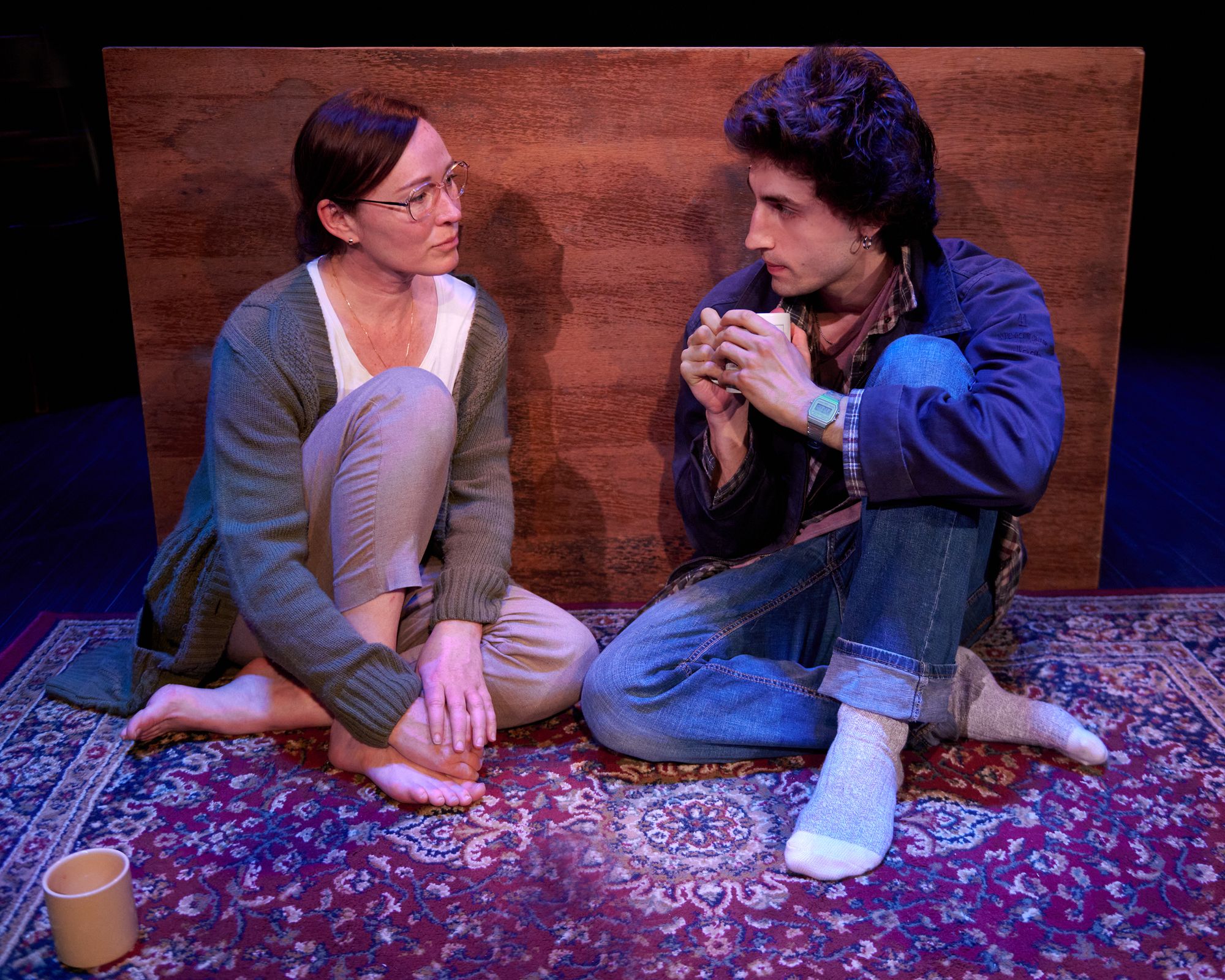
The Sound Inside's unsettling voices
Shaw Festival veteran Moya O'Connell – seen too infrequently on Toronto stages – delivers a haunting, nuanced performance in The Sound Inside (Rating: ✭✭✭✭) that surely would have earned her a Dora nomination had the show opened earlier this season.
She plays Bella, a solitary, middle-aged Yale professor who, from the first moment she introduces herself – in the third person – is clearly obsessed with writing. She's penned two slim volumes of stories and one well-received novel, but the latter was 17 years ago. Instead, she seems content teaching undergraduate creative writing, admiring her collection of first editions and rereading favourite books like James Salter's Light Years.
And then she meets Christopher (Aidan Correia), a serious, intense student who one day says something unexpected in class about Fyodor Dostoyevsky's Crime and Punishment (in the revered Pevear and Volokhonsky translation). Later he shows up, without making an appointment, during Bella's office hours to talk about a novel he's writing. He's abrupt, anti-social, seems to have anger issues and even does something at the end of this first meeting that seems horrible. But the next day he apologizes, cleans up the mess, discusses the beginnings of his novel with Bella... and soon they've formed an unlikely bond.
This narrative doesn't go where you think it might be going, and that's part of the pleasure of Adam Rapp's slippery, suggestive script, which also introduces, early on, the fact that Bella been diagnosed with cancer and – in one of the play's most quietly harrowing scenes – a description of how her mother died a few years earlier.
For a play about two characters obsessed with prose, the writing itself better seem extraordinary. And it is. Bella's reflection about becoming "remote in one's life" feels perfectly judged, as does her observation that "the years suddenly tumble on you." And lest you think the play is all high-minded talk about art and literature, Bella delivers an amusing description of awkward motel-room sex that lightens the mood – all before a devastating gut-punch of a scene.
Nit-pickers might argue that Bella wouldn't do certain things that could jeopardize her academic career. But given her state of mind and health – and keep in mind that she's narrating her story herself, which could be embellished – it seems perfectly (un)reasonable.
More importantly, O'Connell convinces you that Bella – a woman who plays a weekly tennis game with a visiting prof whose last name she doesn't know – is self-absorbed and "remote in one's life." So when she meets a kindred spirit like Christopher, and becomes involved in the fictional tale he's concocting, it makes sense that she'd be drawn in. Correira – a promising and gifted actor from Vancouver – is equally believable as this young writer.
Leora Morris's production enhances the play's mood. A large wooden desk and a couple of chairs in Wes Babcock's spare set are reconfigured to suggest different locales, the drawers often taken out of the desk and stacked to make us (perhaps) think about those areas of our life that are hidden away. Chris Ross-Ewart's score, especially in a climactic moment, adds an element of majesty and heft to the story.
As Bella and Christopher recount things to each other, they'll often interrupt the other and say, "That sounds like writing," meaning: You're trying too hard or too self-consciously to create an effect.
At times, you can see Rapp trying too hard with his dialogue; certainly there's a bit too much insular talk about the literary world. But despite all that, as Bella herself says about good writing, it works.
The Coal Mine Theatre (2076 Danforth) production of The Sound Inside continues until May 28. See more info here.
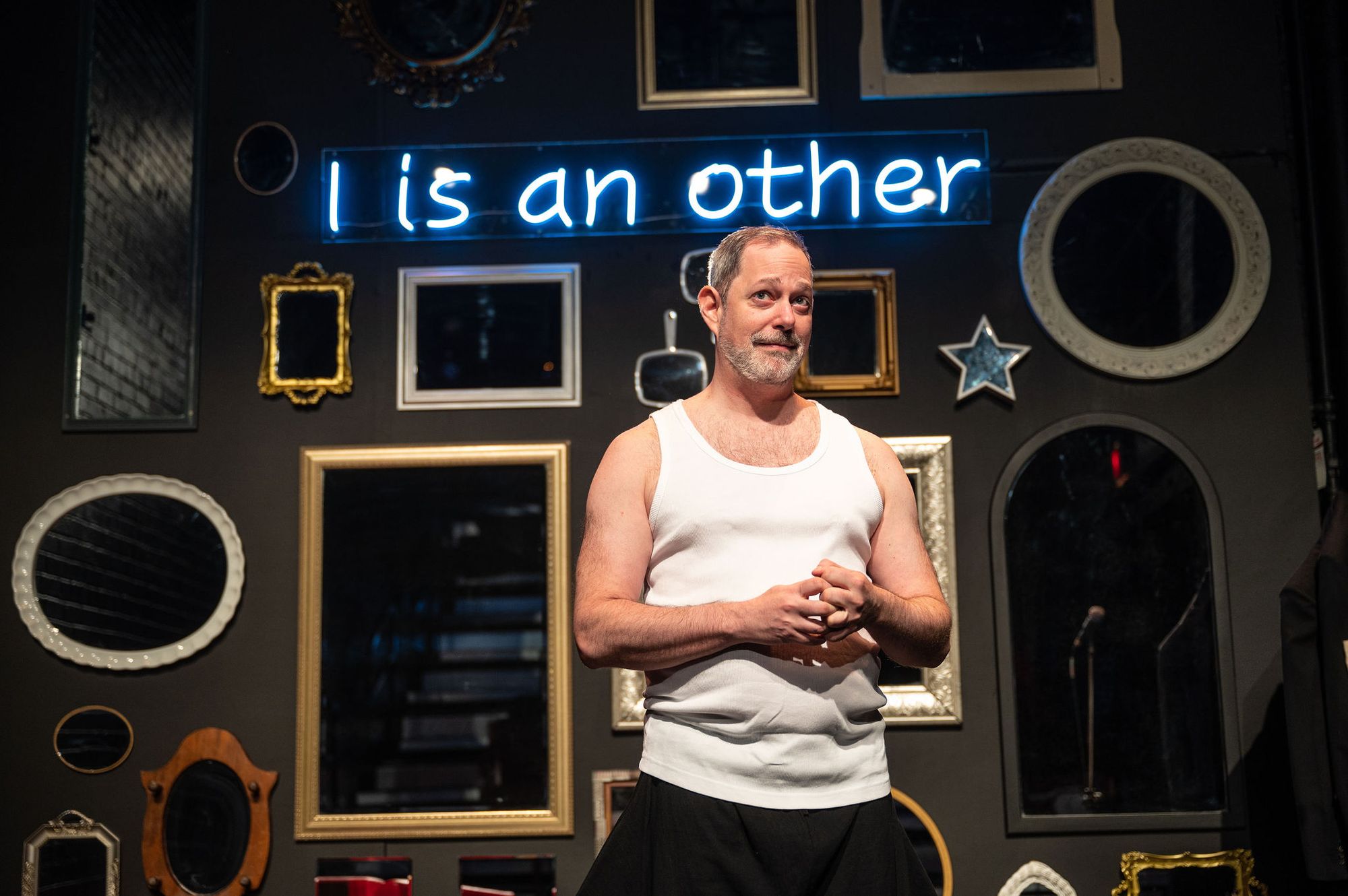
A meta-theatrical marvel
Going into The Rage of Narcissus (Rating: ✭✭✭✭) at Theatre Passe Muraille's Backspace, I had no idea who playwright Sergio Blanco or director Marcio Beauclair were. I had seen the talented actor Matthew Romantini before, but it had been a long time since I'd last seen him on a stage.
Well, now I'm going to pay attention to Blanco, Beauclair and the producing company Expandido Theatre Group.
Like The Sound Inside, The Rage of Narcissus is a sly, self-referential play that partly deals with the act of storytelling itself. The Franco-Uruguayan Blanco specializes in something called autofiction, which blends autobiography and fiction – but onstage.
Romantini explains that he's playing Blanco, a writer and academic who's visiting Toronto to present a talk about the myth of Narcissus at a conference on philology. While checking into his hotel, he opens up Grindr and decides to hook up with a guy named Greg. They have sex. Afterwards, Blanco discovers old blood stains on his hotel room's carpet. Because of the conference, the hotel is fully booked so he can't get another room.
He goes out for his morning jog, prepares for his talk, and hears from Greg, who wants to hook up again. He visits a museum, runs into Greg (cue al fresco sex this time), works on his lecture, Skypes with his mother, who's suffering from dementia. And gradually he becomes more obsessed with those blood stains, which seem to spread and take on different qualities depending on the time of day.
None of this sounds particularly gripping in synopsis, but Romantini delivers his (or rather Blanco's) story at a calm, measured pace, letting the details add up and a sense of dread and mystery build slowly.
Blanco must tailor his scripts for whatever city he happens to be in; here, his professor jogs through Philosopher's Walk, visits a dinosaur display at the ROM, eats at the McDonald's across the street. These details help fix the narrative in our minds, convincing us of something even though it's all likely made up.
Director/adapter Beauclair's production works nicely in the narrow Passe Muraille Backspace, which we come to believe is Blanco's hotel room. Reflections off a wall of mirrors (no doubt to emphasize the Narcissus myth) suggest those menacing drops of blood, as do little pops of colour in a pair of sneakers or a chair. (Renato Baldin designed the set.)
As with any thriller, I shouldn't give away too much of the plot. Let's just say that Blanco delivers many turns of the screw – pun intended – and provides an exciting, mysterious ending.
I don't know if Romantini's version of Blanco is close to the real thing. But the way he uses his voice in public – delivering a lecture, for instance – or in private when tenderly talking to his mother, feels authentic. And the way he navigates the space – whether wearing a tanktop or a dark blazer – gives his presence some weight.
I hope The Rage of Narcissus finds an audience. A delightful mixture of Borgesian puzzle and Highsmith thriller, it's one of the season's most pleasant surprises.
The Rage of Narcissus runs at Theatre Passe Muraille Backspace (16 Ryerson) until May 28. See more info here.
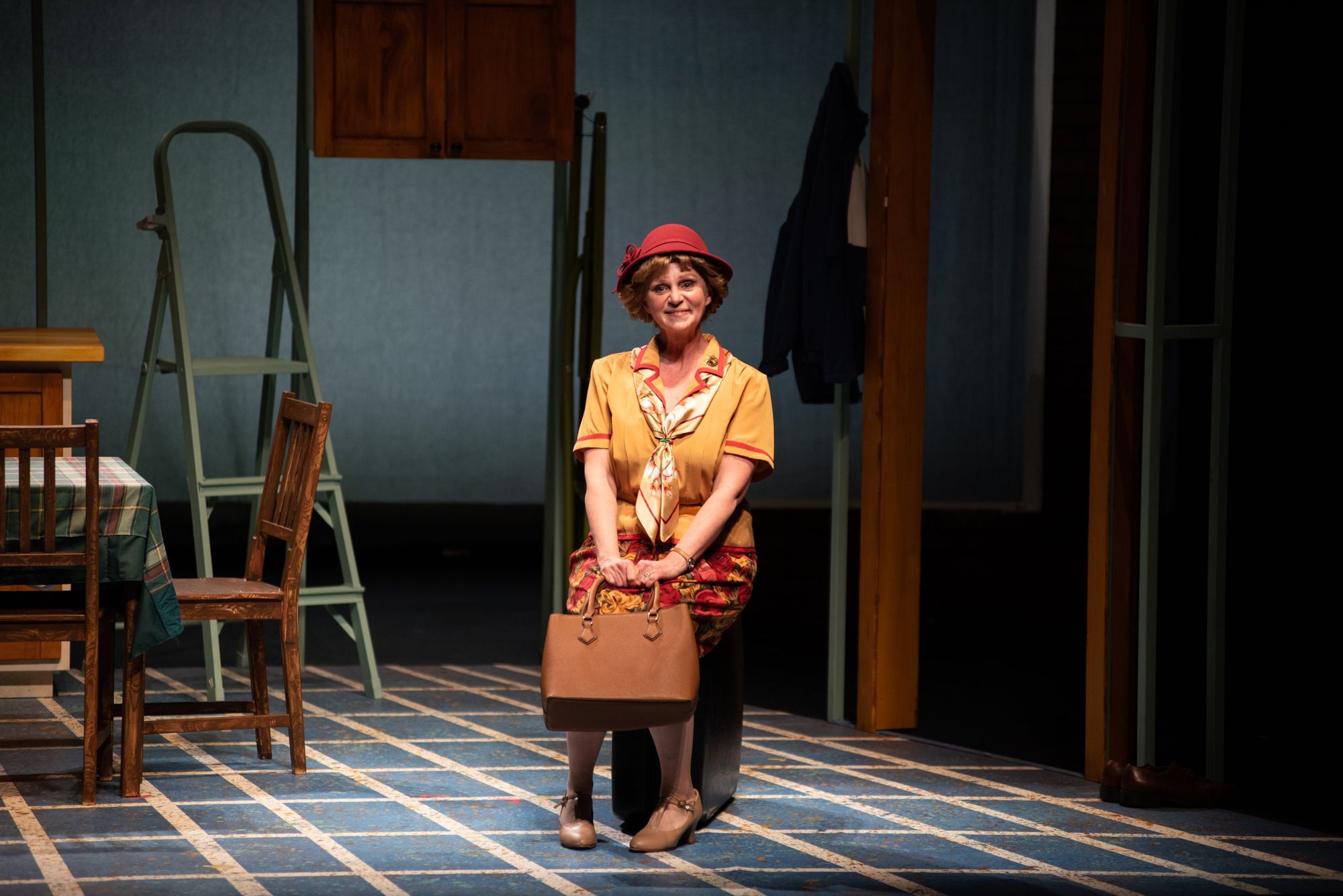
Funny, heartbreaking Valentine
After her wildly different performances last year in Gloria and Doubt, which landed her on my list of the Top 10 Toronto theatre artists, Deborah Drakeford continues to astonish with her warm, generous performance as Willy Russell's Liverpudlian Everywoman, Shirley Valentine (Rating: ✭✭✭✭) at Port Hope's Capitol Theatre.
Russell's 1986 play is probably best known for the film adaptation starring Pauline Collins. But it works quite well as a monologue, a format that emphasizes the title character's isolation and loneliness.
At the beginning of the show, the middle-aged Shirley is literally talking to the walls. She's accidentally spoiled her husband's weekly steak dinner and is substituting "chips and egg" for him, hoping he won't notice. Gradually we get a sense of her life; ignored by her now-grown-up children, she feels more like a maid than a housewife.
Without any sentimentality, Russell fills in bits of Shirley's younger life, and he also introduces us to some of her neighbours and friends, as well as her boorish husband, Joe. When an opportunity to briefly escape from the tedium of her life arrives via a free ticket to Greece from her friend Jane, she grabs it. What will happen? And will she finally discover a sense of self, not to mention understand the power of the clitoris?
Russell's play isn't the most sophisticated work, and director Karen Ancheta and set and costume designer Jackie Chau don't clutter the production with anything fussy or unnecessary. (There's an imaginative use of the first act's drab cabinets in the second act to evoke the new setting.)
Mostly the show is a star vehicle, and Drakeford, wisely eschewing a full Liverpool accent, takes hold of this part and invests it with decades of rich, lived-in experience. She also has a lot to do, including prepare that meal in the first act. There's a reason why this story has endured, as women around the world continue to find their voices and demand respect.
Shirley might not call herself a feminist, but by the end of the play she becomes one. And her journey will warm your heart.
Shirley Valentine continues at the Capitol Theatre (20 Queen) in Port Hope, Ontario, until May 28. See info here.
Jon Kaplan Legacy Fund winners
This has been the most diverse and one of the most exciting theatre seasons in Toronto stage history. And what better way to top it off than with the announcement of the winners of the fifth annual Jon Kaplan Legacy Fund Theatre Awards?
This year's recipients of awards named after Jon Kaplan, NOW’s beloved long-time theatre writer, are: Rachel Mutombo, who wins the award for young Canadian playwright, worth $5,000; Kim Nelson, recipient of the Canadian stage performer award, also worth $5,000; and Abigail Henry, who wins $2,500 as Graduating Student from a Canadian theatre school.
"We announce our theatre awards on Jon’s birthday (May 17) as a way to celebrate his life and his work,” said Don Cole, president of the Jon Kaplan Legacy Fund and Jon's husband, in a press release.
“Jon was devoted to the theatre community, and we support Canadian theatre makers in his honour. Congratulations to this year’s award recipients. We look forward to seeing more of their work on stage.”
Mutombo, who's also an impressive actor, recently premiered her first full-length play, Vierge, at the Factory Theatre; she's also developing a YA play called Homeroom at Young People's Theatre.
Nelson, who graduated from law school in Montreal, has amassed an impressive acting resume that includes last season's Doubt for B&E Theatre Company, This Was the World at Tarragon and Coal Mine Theatre's Breathing Corpses, which Jon reviewed for NOW back in 2016.
And Henry, an actor, dancer and theatre creator, graduated this year from Sheridan College and the University of Toronto at Mississauga, where she worked with Paolo Santalucia, Anita La Selva and Leah Simone-Bowen.
You can learn more about the Jon Kaplan Legacy Fund Awards here.
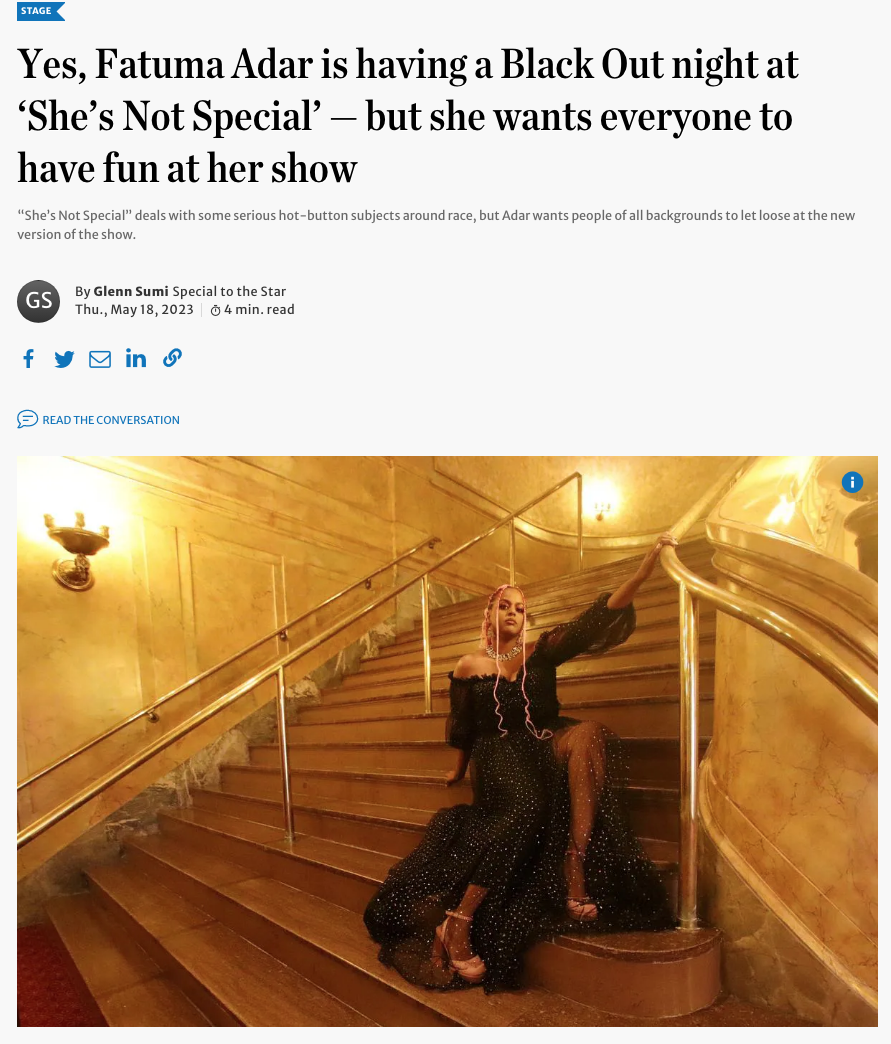
Fatuma Adar's star continues to rise
One of the most anticipated shows of the season is Fatuma Adar's She's Not Special, which hits the Tarragon this week after years of development. Last year she and co-director Graham Isador presented a film version of the show because of lockdown (I loved it); but now they're presenting the show the way they originally intended: as a live show/concert with stories and music.
Recently I interviewed Adar, winner of last year's Best Musical Dora for Dixon Road, for the Toronto Star. Here's the article. Meanwhile, get your tickets now. The co-production between Nightwood Theatre and the Tarragon only runs for five nights. See info here.
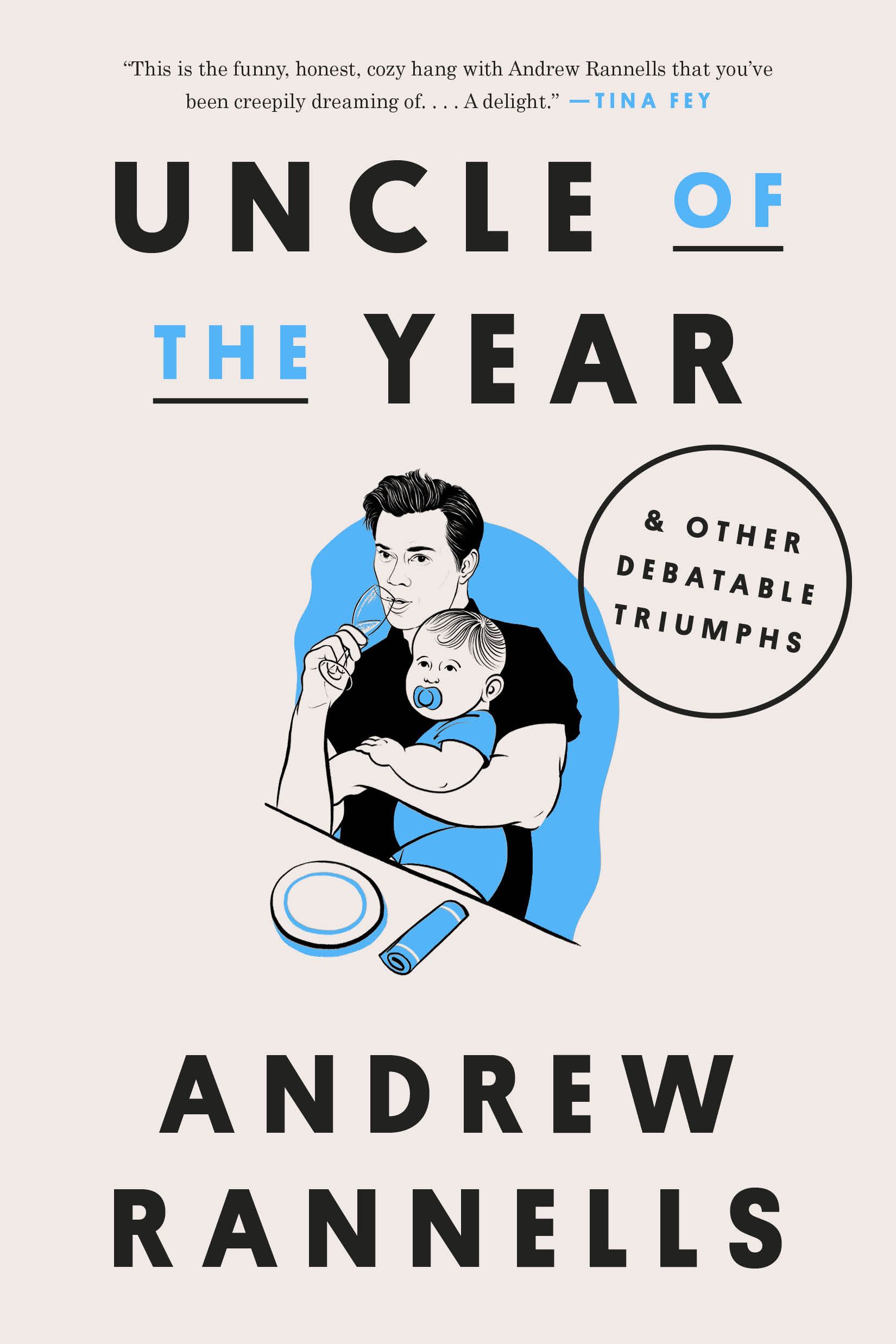
Contest alert!
So Sumi is giving away three copies of Broadway (The Book of Mormon, Falsettos), TV (Black Monday, Girls, The New Normal) and film (The Prom, A Simple Favor) actor Andrew Rannells's just-published collection of essays, Uncle of the Year, courtesy of Penguin Random House Canada.
To win a copy, please answer the following question: What touring Broadway musical brought Rannells to Toronto in 2008?
Send answers to SoSumiContact@gmail.com, with Uncle of the Year Contest in the subject heading. Deadline for entries is Wednesday, May 24 at 6 pm (ET). Winners, who must have a mailing address in Canada and be subscribed to SoSumi (either paid or free), will be contacted by email later this week.
